This translation from German to English was done with the help of www.DeepL.com/Translator
"We are visible in the name of all forgotten women."
Ruhr Youth opens the Feminist Futures Festival
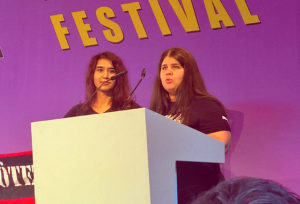
Ruhryouth: "Let us learn to fight from each other!" ©2019 by brandfilme
"As non-white, non-academic women, we were invisible for a long time. And today we stand here and welcome you. As activists of the Ruhr youth, as Kanack women and children of foreign workers. We are visible in the name of all forgotten women. In the name of Emine Bulut and in the name of Farkhundas. We were too long unheard, too long torn between bourgeois white women who wanted to be our voice and non-white men who spoke for us - today we ourselves are loud! Loud for a feminist future! Let us listen to each other and strengthen each other! Let us reflect, question and improve! Let us unite struggles instead of taking them over. Let us learn to fight from each other! For a feminist future!
"Here and now we are creating a space that brings together feminists across national, classicist and racist borders. This place, this colliery is a symbol of our position in society. A sphere of masculinity on the one hand. A place that we acquire solely through our presence.
A sphere of wage labour, a symbol of our class. It symbolizes migrant work, immigration, migration, perhaps even homelessness. And at the same time this place is a part of identification, a piece of home in the middle of the Ruhr area. This festival is a unique opportunity for all of us to organize a new intersectional and solidary feminist struggle. And yes, we want to fight. We don't want to let our struggles be dictated anymore. We want to fight independently and with our own hands."
From within the immigrant working class
At this historic location of the Zollverein colliery, I was delighted to be able to witness those voices at the opening of the Feminist Futures Festival who, as the children of workers women and foreign workers in fossil capitalism and especially in the coal mining industry, represent a special focus in the anti-capitalist analysis of a feminism that is currently forming transnationally - in fact, that was actually something new in our region.
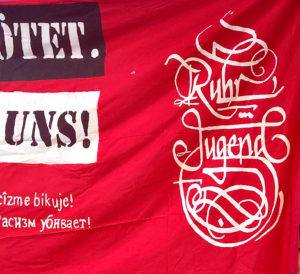
Calligraphy in the Ruhr Area
Yes, it gripped me when they suddenly jumped onto the still empty stage, rolled up their banner „Racism kills. We defend ourselves!" and raised their voices. Voices and presence of people who grew up on the front line of work and migration. The activists* of the Ruhr youth represent the importance of raising children, housework and care work, all unpaid reproductive work for the accumulation of capital and the gross national product of a society. This comprehensive area of life that enabled their parents and mostly their fathers, the workers in coal mining, to go to work in the first place.
With its authentic and radical opening speech from within the immigrant working class, the Ruhr Youth has set a point at the beginning of the Feminist Futures Festival that we shouldn't forget, despite all the subsequent criticism of a too white academic cast in the festival's preparatory circle.
Let's simply hundredfold their voices! Let us bridge our quantitative (and qualitative) deficit - because more anti-racist and black activist groups from Germany should have been invited - and give the Ruhr youth performance a qualitatively multiple measure that is necessary in this sense. "As non-white, non-academic women we were invisible for a long time. And today we stand here and welcome you." That's more than the minutes of this appearance. It's a new kind of presence that can mark the beginning of a shift towards having many more migrant* participants in the inner circles of our social movements in Germany, which was answered by great applause at the opening and a crowded later workshop of the Ruhr Youth under the title: "Intersectionalize yourself! Overwhelmed left: non-white, non-academic, non-left - What to do?". "The people were sitting in the hallway", one of them said. And even with this workshop, which I couldn't attend myself, they hit a nerve.
I have long missed People of Color in the climate justice movement in Germany. I miss them as co-organisers, speakers and co-decision-makers. How often do I hear: "We are a white middle-class movement and have to get out of our bubble". Shouldn't we look into this problem more intensively and thereby put our own visibilities and defined social roles within the movement at the back? With these and other thoughts on contradictions that concern me in the climate justice movement in mind I went to the Feminist Futures Festival. Equipped with my video camera and sound recorder, excited, because for me a rather new setting and suspecting that it will be a work marathon, that I'll just insert in between. It was, and I stayed every four days.
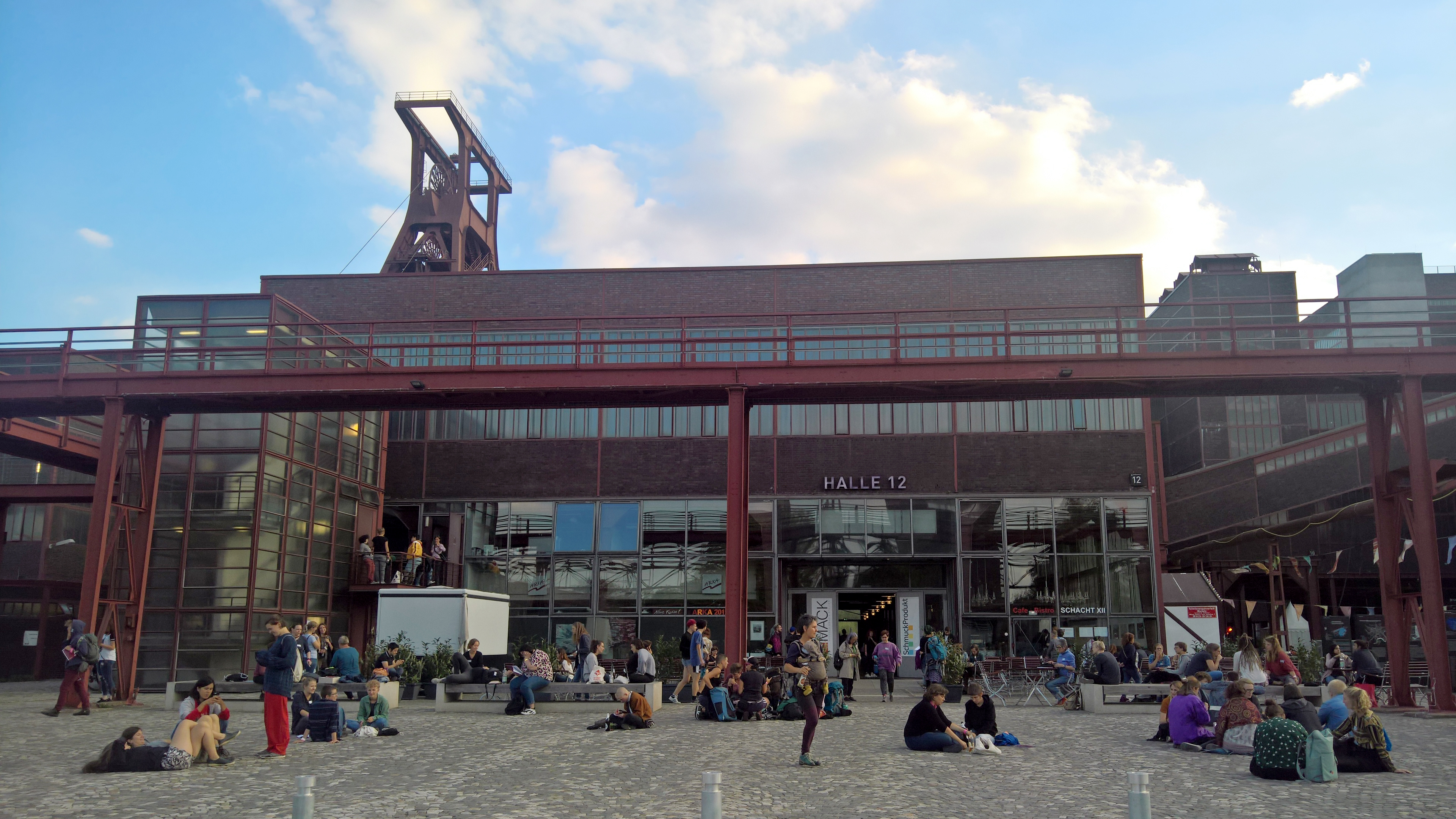
Feminist Futures at Zollverein colliery in Essen: Reviving the Sphere of Wage Labour in a Feminist Way ©2019 by brandfilme
"A fundamental shift in gender relations would hit the core of capitalism."
said Barbara Fried of the preparatory group in the next opening speech. Inspired a.o. by the Argentinian National Women's Meeting, which will take place for the 34th time in 2019 for which more than 70,000 women and queers are expected this year, the Rosa Luxemburg Foundation, the Konzeptwerk Neue Ökonomie, Laboratory for new economic ideas and the Care Revolution Network created the Feminist Futures Festival with participants from more than 40 different countries around the world and around 1,500 visitors.

Feminist Futures Opening event in a crowded hall ©2019 by brandfilme
„What is happening is really impressive. I have never really experienced something like this in my life. The mass dimension and the political quality of the feminist movement, of this new feminist around the world is absolutely astonishing.“
Cinzia Arruzza on the current international feminist meetings. It is about an anti-capitalist clout that is able to unfold feminism as an
„antithesis to the attack on the rights of women, migrants and LGBTIQs and many others“ in combination with „the economical critique of capitalism based on gender segregation and division of labor“, Barbara Fried continues. It aims "at the whole of work and thus has the whole of life in view".
„We don’t want more women managing power individually, we want power to be back to the majority of people“
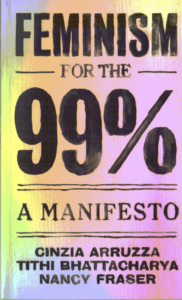 Quote from the video interview with Cinzia Arruzza. She is a philosopher at the New School of Social Research in New York and co-author of the book and Manifesto "Feminism for the 99%".
Quote from the video interview with Cinzia Arruzza. She is a philosopher at the New School of Social Research in New York and co-author of the book and Manifesto "Feminism for the 99%".
In the interview she gives us an in-depth and contemporary explanation of the economic analysis of reproductive work, talks about the potential of feminism to unite different struggles, about how far the social movements have a class character, which would mean a new approach of analyzing and understanding their struggle with regard to the conception of strategies. She talks about the immense importance of indigenous struggles for the environmental movement, about the role of men in the movement, and about how feminism has changed. "...less normative, much more open to the different ways in which subjectivities are at stake". She talks about feminism as a trans-feminist movement, the meaning of the union of women's strike and labour strike, about overcoming the separation of theory and practice, and last but not least, of course, about the rejection of a feminism that fights for equal opportunity in domination and has no problem with exploitation.
See the Interview (38min) on vimeo.
A feminist basis
Perhaps, I think, the liberating character of this feminist movement also stems from this - "The whole of life in view". At the end of the festival and with regard to a communicative practice of a social movement that in my opinion must necessarily be open and controversial, this was shown concretely in the organizers'* capacity for criticism. The critique was in short: too white, too academic, too much middle class.
The group of bridge builders had already formulated it at the opening of the festival: as a group in the preparatory circle, they aimed to prevent the perspectives of black women, migrant women and women of colour, feminists of the poor and working class, queers, queers of colour, trans- or unemployed activists from being pushed back behind those of white, middle-class feminists, academics and heirs.
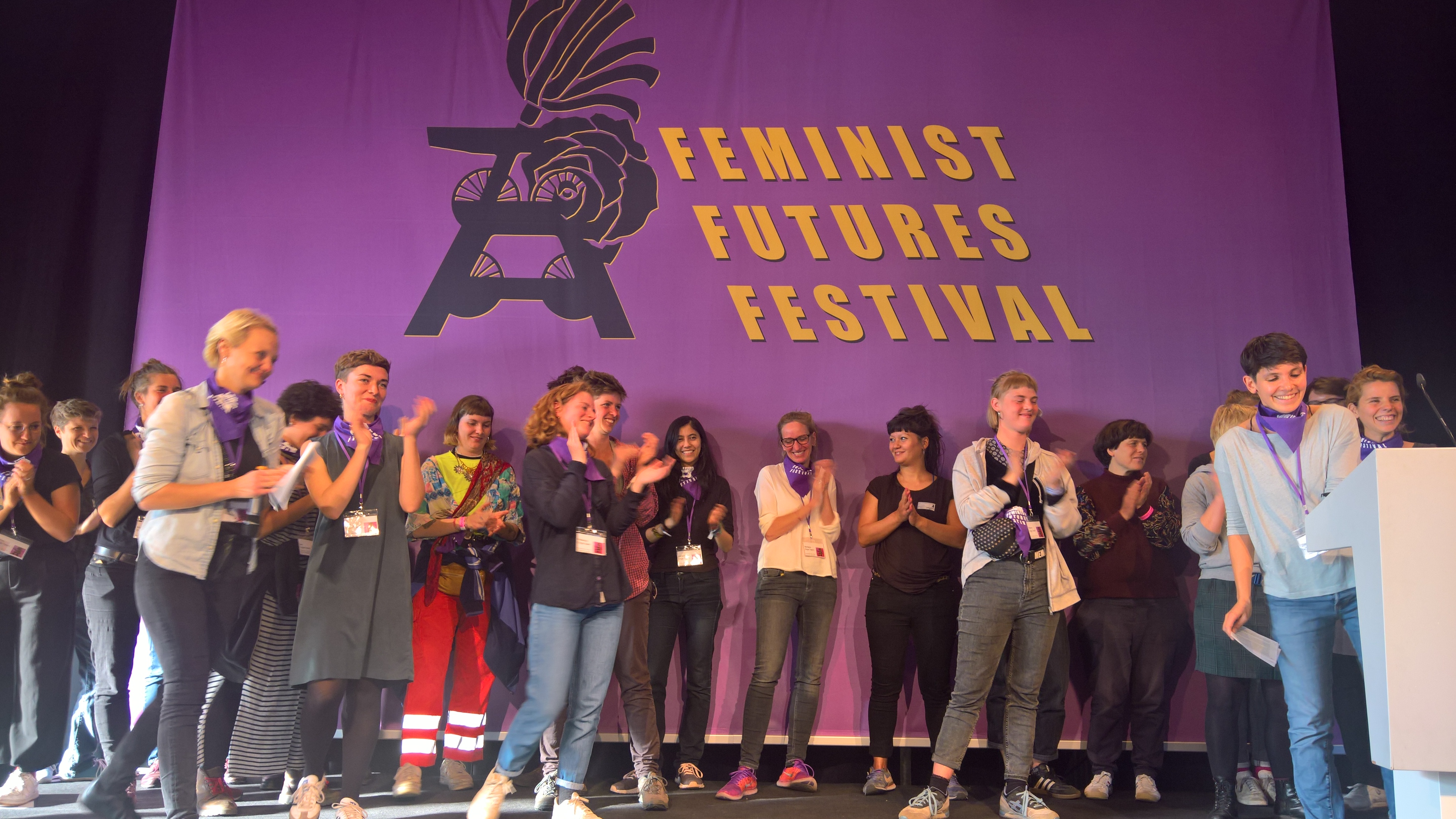
Feminist Futures: The preparatory circle presents itself ©2019 by brandfilme
And Francis especially emphasized the presence of
"Workers*women's children, feminists*women from poverty or working-class contexts*, prololesbians, people active in trade unions. And I found it not so easy and I would like to ask you to self-critically consider in the course of the festival to what extent this actually succeeded."
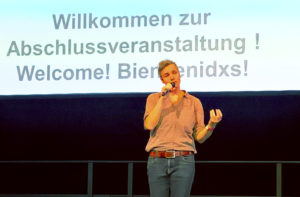
Feminist Futures: Experienced moderator of major events Jutta ©2019 brandfilme
The ground was laid for a self-critical debate, and even if it had not yet succeeded properly: The fact that any liberation from division, separation and discrimination also lies in the consideration of one's own possible participation is in focus, I at least got this impression despite failures and missings. The continuous review of one's own possible prejudices and conditioning as well as one's own motives, why and for what I do something is a reliable tool for me anyway.
At the end, the critics were first taken to the stage before being brought out by the two presenters Britta and Jutta in an overall round of spontaneous speeches. The result was a collective atmosphere that might have the potential to develop into a movement capable of dealing adequately with all the contradictions. Feminism should actually be the basis and not a part of any social movement, becomes clear to me these days, since it seems as if there is a mutual promise for a more honest collective approach. A feminist basis would perhaps be the solution to the often creeping patriarchal patterns in social movements that separate, divide, exclude and promote competition for social recognition. Where then is simply more diffuse fear in the air. Where social behaviour develops, where people who would like to join are prevented from doing so or where they "leave shared spaces", as Atlanta from the group of bridge builder put it. The collective, which is constantly open to criticism, is therefore a must. The fact that this has happened has encouraged me and strengthened me.
“I want to say thank you to the guests, the speakers, who have come from abroad, who have taken all the trouble to come here to present their struggles and strategies so that we can network. A little pain of saying goodbye is already spreading to me, because I think it was much too short and I have a very big need to get more involved and to actually think about concrete next steps, how we can work together transnationally, where of course these 2,3,4 days were much too short.“ A participant.

